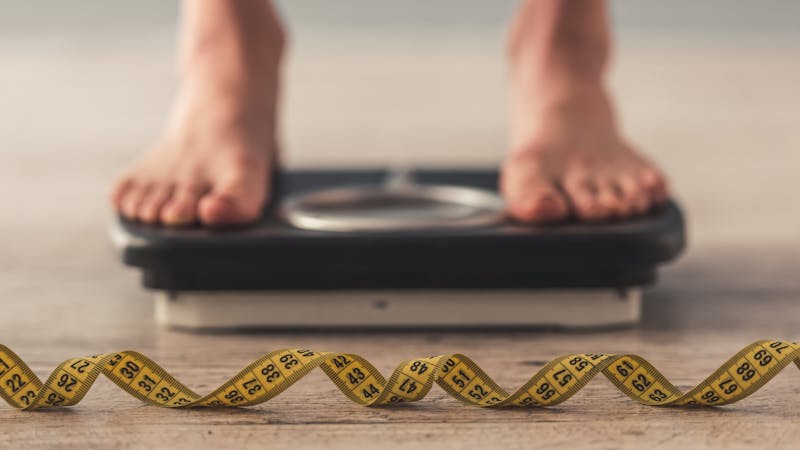Weight, health and happiness: striking the right balance
If these are your goals, you’re not alone. In fact, about half of all Americans report that they’re trying to slim down; the numbers are similar in many other countries.
We understand many individuals want to lose weight quickly and keep it off. Some of us have been those individuals! We understand that many people come to Diet Doctor for help with weight loss, and we’re glad they do.
Helping people lose weight in a safe, sustainable way — a way that lets you have a life, not just a diet — is one of our most important jobs. But right now, we’d like to have a much different — and maybe more difficult — conversation about weight and weight loss.
There can be downsides to trying to lose weight, even if the overall goal is to improve health. Sometimes the number on the scale can determine a person’s mood for the day. Some individuals find themselves obsessing about what they should eat — and more often, what they shouldn’t. Some worry about how much they should weigh and wish for a body they think they should have.
Pervasive messages that we can all reach our ideal size if we just work hard enough encourage this kind of thinking.
But for some of us, losing weight seems more difficult than it is for others. And for those of us who struggle with weight loss, being told that a slender body is just a matter of willpower can be hurtful.
At Diet Doctor, our mission is to help interested people follow a low-carb or higher-satiety lifestyle that improves their health. Our core values are trustworthiness, simplicity, inspiration, and goodness. Because we feel it’s important to uphold these values, we decided it was high time to have an honest and difficult conversation about weight, weight loss, and health.
1. What is good health?
“You can have all the riches and success in the world, but if you don’t have your health, you have nothing,” goes a popular saying. And it’s true. No amount of money can buy good health. But what is “good health,” exactly?
According to the World Health Organization (WHO), “Health is a state of complete physical, mental and social well-being and not merely the absence of disease or infirmity.”
Sounds good, but what does that mean?
Most of us would probably agree that health includes:
- Maintaining good energy levels during work and play
- Feeling well rested after a good night’s sleep
- Interacting positively with family and friends on a regular basis
- Managing chronic medical conditions effectively
- Having an optimistic outlook and good quality of life
Some people choose to eat a specific way for health-related reasons. For instance, people with diabetes may follow a low-carb lifestyle because it helps keep their blood sugar in a healthy range and may reduce their risk for complications.
However, many of us make food choices based on our desire to lose weight. We use “health” as the rationale for focusing on weight loss, when — if we were honest with ourselves — sometimes weight loss is more about looking a certain way than feeling healthy.
A key piece of the good health puzzle is having a healthy relationship with food. This often has less to do with what you eat than how you think about food.
Having a good relationship with food means different things to different people. But at least one part of everyone’s interactions with food should include recognizing that food must nourish us. Focusing on how food choices affect weight can interfere with that.
As long as our heads remain firmly attached to our bodies, a healthy body and a healthy mind are really the same thing. Stressful interactions with food can damage our health as much as eating foods we know will make us feel lousy.
2. Does weight loss automatically mean better health?
It’s impossible to ignore the countless weight loss messages we’re exposed to online, on TV, at the doctor’s office, and on magazine covers we scan in the grocery store check-out line. Clearly, as a society we place a high priority on being slim. But losing weight may not always lead to better health.
If you’re at or near normal weight and in good health, dropping a few pounds or kilos is unlikely to improve your health. What’s more, even if you’re overweight or obese, some evidence suggests losing weight may not automatically make you healthier or help you live longer.
There are healthy and less-than-healthy ways to lose weight. Unfortunately, some methods that produce rapid initial results can often be counterproductive for both health and weight long term. These include:
- Very-low-calorie dieting
- Liquid diets or long-term fasts
- Extremely low-protein diets (such as eating only vegetables or fruit for days at a time)
- Using “fat-burning” supplements
Many of these weight loss strategies don’t provide enough essential nutrients — the kind your body can’t make on its own — to meet your needs. When that happens, you may experience hunger, fatigue, dry skin, and hair loss, among other issues. What’s more, you’ll be at increased risk of losing bone and muscle.
It’s not a stretch to suggest that, over time, if your body doesn’t receive the nutrition it needs while losing weight, you’re likely to feel worse, not better.
That doesn’t sound like a good tradeoff for faster weight loss!
3. How much control do we have over our body size?
You may have heard that most people who lose weight regain most or all of it. Sadly, this seems to be true.
Guarantees that you can have “the body you’ve always wanted” if you just follow the right diet are attractive, but deceptive. Can you improve your health? Perhaps. But promises that you can get down to a certain weight or clothing size often go undelivered, especially when these promises come with a timeline. Maybe some people can “Lose ten pounds in ten days!” but not most of us.
And, of course, many strategies that result in a pound per day of weight loss are unhealthy, unsustainable, and will be followed by a regaining of all the lost weight.
You can do everything “right,” but the amount of weight you lose and the time it takes for you to lose it may be partially predetermined by genetics and life events. You can work within your range of potential, but not everyone can achieve an “ideal” weight.
It’s hard to talk about and even harder to accept. But the truth is we have little control over many influences on our body size, regardless of what we eat, such as:
- Genetics: According to researchers, 20-80% of our body size is determined by our genes.
- Epigenetics: Outside forces — such as trauma, exposure to environmental toxins, and food scarcity — can affect how genes are expressed, turning on or off specific inherited genes.
- Mother’s diet during pregnancy: Maternal nutrition is a type of epigenetic influence and may affect a child’s health outcomes into adulthood.
- Dieting history: If you’ve lost and regained weight several times in the past, you may find that it’s increasingly harder to lose now — and easier to gain.
- Stress: Being stressed, whether it leads to additional eating or not, can lead to weight gain.
- Medical conditions and medications: Hypothyroidism, polycystic ovary syndrome (PCOS), Cushing’s disease, and other conditions have strong ties to weight gain and obesity.
- Perimenopause and menopause: Although there is variability among women, most tend to gain some weight during this time.
Clearly, many things beyond our control affect body size and shape. Many of us simply can’t achieve the body we want, even when giving it our very best effort.
Saying that this isn’t fair is an understatement. But much of that sense of unfairness comes from society’s habit of blaming individuals for things not entirely under their control, like body size and health.
The good news is that learning to appreciate our bodies as they are today can be a huge step forward in self-love and acceptance — and that is also part of good health.
4. What is a “healthy weight?”
Those whose body mass index (BMI) places them in the “overweight” or “obese” category are subject to a steady drumbeat of health messages about the increased risk for diabetes and other chronic diseases. These messages reflect how much value medical, nutritional, and public health professionals place on using BMI to evaluate health.
BMI, however, is based solely on weight and height rather than body composition and where body fat is stored. Therefore, even though BMI is a useful tool for assessing populational health, it doesn’t always tell us everything we need to know about the metabolic health of an individual.
Oftentimes losing weight leads to health improvements like lower blood pressure and loss of liver fat, benefiting those with diabetes, heart disease, and other metabolic disorders.
Maybe not.
Within the past several years, researchers have recognized that some people classified as overweight or obese can be just as metabolically healthy as those who are of “normal” weight.
As with many issues in medicine, though, the concept of metabolically healthy obesity (MHO) is controversial, with significant nuance to consider. For example, there are copious data suggesting that MHO may be a transient state; in other words, someone with MHO may appear healthy now, but they are at risk for progression to metabolically unhealthy obesity, given time.
Further, despite a lower risk of type 2 diabetes and heart disease as compared to unhealthy obese people, the risk is higher for people with MHO compared to lean people. Finally, many people who might be classified as having MHO suffer from joint pain due to excess weight, pulmonary disease, higher cancer risk, and psychosocial impairment.
So what should we make of this? The take-home message is that it is possible to be metabolically healthier than a BMI number might suggest; talk to your doctor about whether your blood sugars, blood pressure, triglycerides, HDL, and waist circumference show that you are healthier than what the scale seems to show.
It’s also important to recognize that a healthy weight can be one at which you feel energetic and able to do the things you want to do without too much discomfort. This would be a weight that you can easily maintain without hunger, while meeting all your essential nutrition needs.
In summary, “healthy” can look different to different people; it doesn’t have to include weight loss for everyone. Our idea of “healthy” includes the use of low-carb, keto, or higher-satiety diets when they help people feel better, enjoy their lives, and improve many of their health markers.
5. What affects the way we eat?
Why do we eat? It’s a simple question, but the answer is often complex.
Food provides energy (calories) and nutrients we need to survive: essential amino acids in protein, essential fatty acids in fat, and dozens of vitamins and minerals our bodies can’t make on their own.
Although our bodies are driven to eat in order to meet these nutritional needs, we often eat for other reasons, too.
- Emotional eating: Eating our feelings — it’s something most of us have done at one time or another. Also known as stress eating, emotional eating can range from consuming a pint of ice cream after a breakup to frequently reaching for food to relieve anxiety, sadness, boredom, or anger.
- Food addiction: Although some experts question whether this is truly an “addiction,” there are people who constantly crave specific foods and find it nearly impossible to stop eating them once they’ve started. This feeling isn’t limited to those who are overweight. However, overweight people who score high on the Yale Food Addiction Scale have a much stronger response to food cues than people of similar weights with lower food addiction scores.For many of us, eating sweets and highly-processed carbohydrates or carb-fat combinations are what trigger cravings and drives us to continue eating beyond fullness.
But eating for reasons besides nourishment isn’t always a negative thing. We also eat to celebrate, to strengthen ties to our cultural heritage, and to be in fellowship with others.
6. How does social media affect our views about body size and diet?
Many people have a “dream” clothing size or weight. And, for many of us, that “dream” body is smaller than the body we have now, regardless of our current size or shape.
This is so common that we don’t even question it. Today all of us — but especially women — are under intense pressure to be lean and fit. Yet less than 100 years ago, curvier figures were desirable, and “skinny” girls were considered less attractive.
Although it started several decades ago, our obsession with thinness or the “thin ideal” has escalated dramatically in recent years. And research suggests that social media use has been a major driver for this trend.
How does engaging in weight- or diet-related social media activity affect us?
Before-and-after pictures can be inspirational, but they also place a high value on weight loss and looks. Some people who have lost weight have privately shared with us that they dislike the response they receive to these side-by-side photos because it makes them feel exploited.
Which is more important, looking lean and fit or being healthy? On Instagram and other social media sites, slender, toned bodies generate excitement and interest. Yet in most cases, we have no idea how these physiques were developed and are being maintained. Inadequate nutrition, excessive workouts, and other harmful weight loss strategies may be used to achieve the bodies we envy.
Comparing ourselves to the many “perfect” bodies we see online can make us feel inadequate. People might look at these photos and think, “I’d give anything to look like that!” That’s often the reaction that the poster is going for, especially if what you’d give is money!
These “perfect” online bodies are often promoting supplement regimens, bars and shakes, expensive diet and fitness programs, or a monetized website that gets its revenue from “clicks.” Making people feel bad about themselves is a tried-and-true way to get them to spend money.
7. You might have an unhealthy relationship with food if…?
What could be bad about “healthy eating?” Isn’t being careful about food choices the most important thing we can do for our own health?
Yes. But. Sometimes “healthy eating” turns into an unhealthy preoccupation with food and body image, although it’s often hard to pinpoint when or how this happens.
“Orthorexia,” a term coined in 1998, is an obsession with proper or “healthful” eating. For some this involves eating a diet of “pure” foods solely for health reasons. However, those with “orthorexia nervosa” make “healthy” food choices mainly because they want to lose weight.
Orthorexia isn’t classified as an eating disorder like anorexia nervosa, bulimia, or binge-eating disorder. But it is considered “disturbed” eating, and it doesn’t reflect a healthy relationship with food.
Disturbed or disordered eating is complex and must be diagnosed by a trained professional. However, here are a few signs that a person may be overly focused on food and weight rather than health:
- Preoccupation with calories and macronutrients to the point that it dominates much of a person’s free time
- Avoiding eating with others, including at restaurants and celebrations
- Weighing frequently (more than once a day)
- Working out daily, even when sick or injured, in order to “burn off” calories
8. How does a low-carb diet fit into this picture?
A desire to lose weight is the number-one reason people begin eating a low-carb diet.
But it doesn’t work that way for everyone. Some people lose weight initially on low carb, but then stop losing weight or even gain a bit back.
It’s important to realize that even on a perfect low-carb diet, weight loss doesn’t always happen the way we’d like.
Again, it’s absolutely not fair. But it’s something about which we need to be honest.
When people’s low-carb results are not the ones they want, sometimes they get the impression they just need to “keto harder.” This can lead to a truly restrictive diet, extended fasting, and other behaviors that for some can undermine long-term health.
Instead, we’d like to help people focus more on low-carb’s health benefits and the many non-scale victories this way of eating brings, like:
- Powerful appetite control
- Higher energy levels
- Stable blood sugar
- Lower insulin levels
- Lower blood pressure
- Reduced cardiovascular risk factors
- Eliminating or reducing medication
In fact, studies confirm that focusing more on health and less on weight loss makes sense. Research shows that eating low carb can improve diabetes, fatty liver disease, and other metabolic diseases, even if weight loss doesn’t occur.
And those looking for other options beyond strict low carb eating should consider higher-satiety eating. You can learn more about higher-satiety eating in our explanatory guide.
9. Summary
Weight loss struggles, pressure to be thin, poor body image, and unhealthy relationships with food are loaded topics. It can be hard to talk about these things without getting upset and discouraged. Those of us who wrestle with these issues can feel both that life is unfair and — at the same time — that we should just try harder.
But health is something we shouldn’t take for granted, and pursuing an unrealistic body size can actually undermine it. Plus, chasing a number on the scale or a certain clothing size takes up precious time and energy that you can never get back.
On the other hand, learning to appreciate your body and feed it what it needs — rather than trying to force it down to a size it wasn’t designed to be — can be liberating, stress-relieving, and therapeutic.
In short, aim to be the best version of “you” that you can be!
Envisioned and edited by Adele Hite, PhD, RD.



